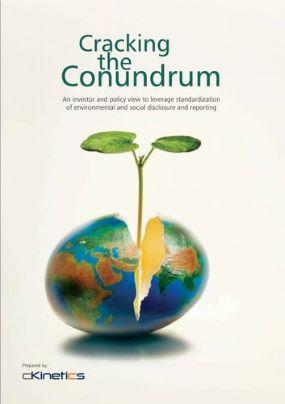
An emerging group of investors, globally and in India, are looking beyond the customary financial returns, and integrating Environmental and Social (E&S) information in their investment decision making. The advent of these investors and their needs have been manifested in an increasing demand for greater disclosure and reporting of E&S information by businesses in India. However, E&S information currently is both limited and scattered. This background predicates the question: Can such investors, which are using E&S information and targeting India, find a standardized and reliable means to get this information and make investment decisions more effectively?
‘Cracking the Conundrum’ details how investors can converge to crack the key conundrum of standardization of E&S disclosure and reporting: ‘a standard will get accepted only if it has a large number of adopters, however adoption will only happen if a standard gets accepted’.
As per the latest estimates developed by cKinetics, these investors (referred to as Finance+ investors) represent Rs 3 trillion ($55 billion) in India, which is 1% of the world’s total responsible capital. In addition to this, Indian and Global banks are lending Rs 4.4 trillion ($80 billion) to sectors, in which E&S factors are considered.
The report makes the case that as standardization of E&S reporting occurs, investors that have adopted it will increasingly interact amongst themselves. Their Assets Under Management (AUM) is expected to grow from Rs3 trillion ($55 billion) presently to Rs5.5 trillion – Rs9.6 trillion ($100 billion – $175 billion) in 5 years and forecasted to be at Rs13.2 trillion – Rs17.3 trillion ($240 billion – $315 billion) in 10 years.
The present AUM of Rs 3 trillion is largely held with private equity providers like Social investors, E&S funds, SRI funds and DFIs. In addition, another Rs 4.4 trillion ($80 billion) of capital is being managed by Indian and Global Banks, using the E&S criteria. The table below depicts the capital management of these investors.
Indian E&S disclosure policy is presently amongst the most progressive globally: that will be a key driver
During the course of the analysis undertaken for the report, several groundbreaking voluntary and mandatory E&S disclosure and reporting requirements were announced and are presently making their way into the mainstream. Several progressive policy enactments made in this period, include, the National Voluntary Guidelines for Social Environmental and Economic Responsibilities of Business (NVG-SEE), the mandate by Securities and Exchange Board of India (SEBI) requiring the largest businesses to file an Annual Business Responsibility Report (ABRR), Guidelines on Sustainable Development and Corporate Governance for Central Public Sector Enterprises (CPSEs), and the work by the Institute of Chartered Accountants of India (ICAI) in developing a framework for sustainability reporting.
File Name: cracking-the-conundrum-by-ckinetics
